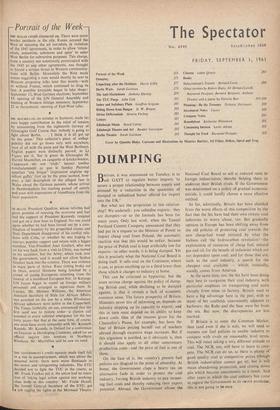—Portrait of the Week— THE BERLIN CRISIS simmered on. There
were more border incidents in the city. Russia accused the West of misusing the air corridors, in violation of the 1945 agreements, in order to allow 'revan- chists, extremists, saboteurs and spies' to enter West Berlin for subversive purposes. This charge, from a country not notoriously preoccupied with the 1945 or any other agreements, was thought to herald a serious threat to Western communica- tions with Berlin. Meanwhile the West made noises suggesting a note would shortly be sent to Moscow proposing talks later this month—with or without France, which continued to drag its feet. A possible timetable began to take shape: September 17, West German elections; September 19. opening of the UN General Assembly and meeting of Western foreign ministers; September 25 or thereabouts. opening of East-West talks.
mit. MACMILLAN, on holiday in Scotland, made his own happy contribution to the relief of tension by announcing from the eighteenth fairway of Gleneagles Golf Course that 'nobody is going to fight about Berlin. . . . I think it is all got up by the press.' This collector's piece of unflap- pability did not go down very well anywhere, least of all with the press and the West Berliners. English papers were distinctly peeved; as Le Figaro put it, 'Sur le green de Gleneagles M. Harold Macmillan, en casquette et knickerbocker, s'appuyant sur son "club," laissait tomber nonchalamment ce que le Sunday Pictorial appellait "une brique" (expression anglaise sig- niflant gaffe).' Got up by the press seemed, how- ever, a fair description of the alleged fuss in Wales about the German panzers, whose arrival In Pembrokeshire for training passed off calmly and even with expressions of friendliness from the local population.
IN BRAZIL President Quadros, whose reforms had given promise of rescuing the economy and had had the support of President Kennedy, resigned and got on a slow boat to England. No one could agree whether he had been forced out by a com- bination of hostility by the propertied classes and State Department disapproval of his cordial rela- tions with Cuba, or whether he was hoping to canvass popular support and return with a bigger mandate. Vice-President Joao Goulart, who was on his way back from a visit to China, was named as his successor, but the Army, which took over the government, said it would not allow Senhor Goulart back into the country. There was violence in many parts of Africa. Race rioting broke out in Oran, several Moslems being lynched by a crowd of young Europeans returning from the funeral of a murdered European boy. In Katanga UN forces began to round up foreign military personnel and arranged to repatriate them. In Lusaka, Mr. Mennen Williams, the American Assistant Secretary of Stale for African Affairs, was punched on the jaw by a white Rhodesian. African saboteurs were active in the Copperbelt. 'The Times, faithfully on cue, announced that the first need was to restore order—a clarion call sounded in every colonial emergency for the last forty years—but that at the same time, of course, one must have every sympathy with Mr. Kenneth Kaunda. Mr. Kaunda, in Oxford for a conference on Tensions in Developing Countries, asked for an official inquiry into tensions in Northern Rhodesia. Mr. Macmillan said he saw no need.
THE GOVERNMENT'S credit squeeze made itself felt in a rise in unemployment, which was above the seasonal norm; there were more dismissals in the motor and refrigerating industries. The ETU decided not to fight the TUC in the courts; as Mr. Frank Foulkes put it, the union had no inten- tion of 'taking legal action against any working- class body in this country.' Mr. Frank Haxell, the former General Secretary of the ETU, got a job rigging the lights at the Mermaid Theatre.


































 Previous page
Previous page